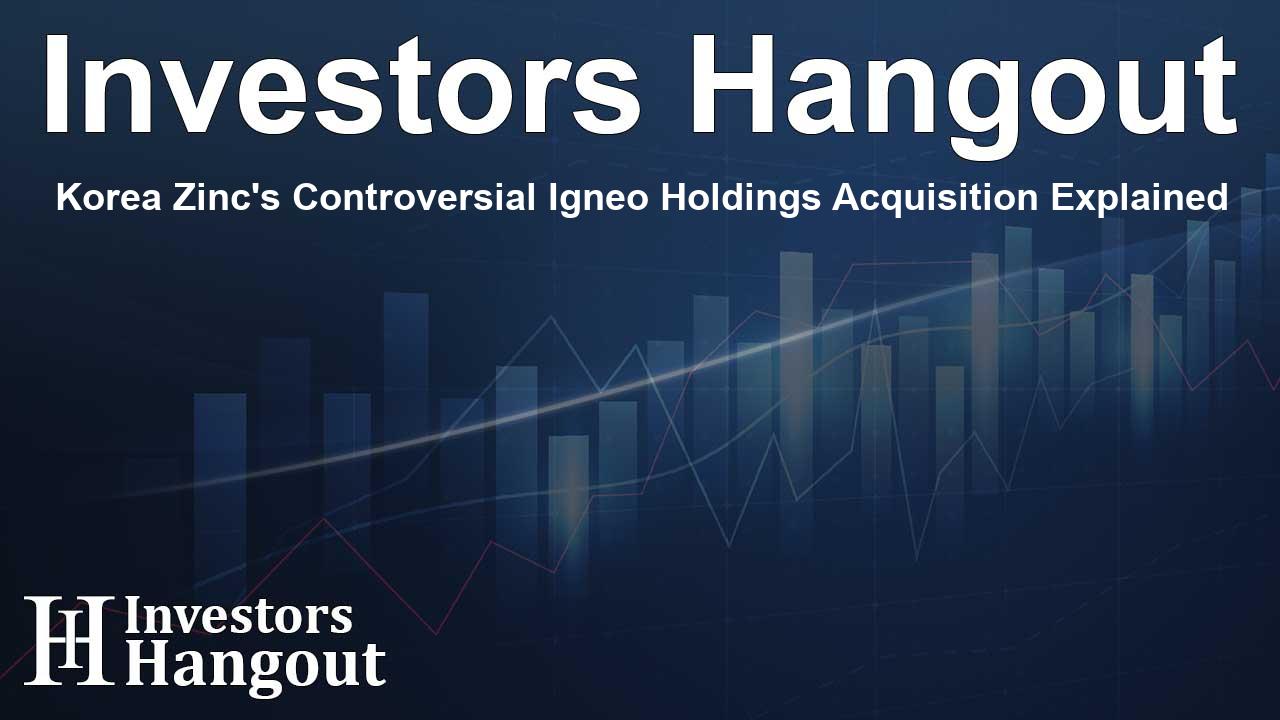Korea Zinc's Controversial Igneo Holdings Acquisition Explained

Korea Zinc's Intriguing Acquisition of Igneo Holdings
Korea Zinc's acquisition of Igneo Holdings has become a topic of intense scrutiny, raising eyebrows over the massive profits garnered by the sellers during this transaction. At the heart of the matter lies the relationship between the company and the sellers who realized profits exceeding 100 times their initial investment in the acquisition.
Details Surrounding the Acquisition Deal
The acquisition process was executed in two phases, with Korea Zinc acquiring 100% ownership of Igneo Holdings through a subsidiary named Pedal Point, which was set up in the same year. This transaction cost more than KRW 580 billion (around USD 450 million). A particularly striking detail is that Korea Zinc paid over 50 times the total revenue Igneo reported in 2021 – an unusually high valuation given the company's financial standing, which included negative equity of KRW -1.9 billion by year-end 2021.
The Uncommon Timing and Valuation
Founded in February 2021, Igneo Holdings was a mere 18 months old at the time of its first acquisition discussions. Negotiations began as early as July 2021, just five months following Igneo's establishment, under a non-disclosure agreement. The agreed acquisition price was markedly higher than expected, being more than 100 times the company’s initial capital.
Return on Investment for Founding Shareholders
Igneo's initial capital was roughly $2.75 million. However, Korea Zinc shelled out about $300 million for the shares, translating to share prices that exceeded 100 times the initial investment. For the founding shareholders of Igneo, this amounted to a 100x return in just a year and a half.
Key Players in the Transaction
The sellers included MCC NFT, which held a notable 47.5% stake in Igneo. Investment funds involved, such as PCT Igneo Investor LLC, achieved impressive returns with minimal initial investments. For instance, PCT invested just USD 1.05 million and reaped over USD 101 million, showcasing a staggering return of more than 100 times in a short span.
Concerns Raised by Major Stakeholders
MBK Partners and Young Poong, the primary shareholder alliance of Korea Zinc, have raised questions regarding the connections among the selling entities, particularly MCC NFT and Tarsadia Group. MCC NFT’s largest stakeholder is The Tarsadia Group, known for its 5% direct stake in Igneo and active involvement in the acquisition process. The transparency in relationships among these investment funds is vital to maintain shareholder trust.
The Call for Transparency
With MBK Partners emphasizing the necessity for clarification on Chairman Choi Yoon-beom's role and knowledge regarding the sellers' relationships, they demand that all affiliations be disclosed. According to them, high-value transactions should never occur without thorough due diligence concerning the involved parties. This lack of clarity has heightened concerns about the corporate governance surrounding Korea Zinc's acquisition strategies.
Broader Governance Implications
This controversy surrounding the acquisition has invoked greater discussions about corporate governance and accountability within Korea Zinc. The circumstances surrounding this transaction underscore the importance of transparency, especially in high-stakes decisions that can significantly impact shareholder interests.
Frequently Asked Questions
What triggered the controversy over Korea Zinc's acquisition?
The controversy arose from the significant profits made by sellers, exceeding 100 times their initial investment, raising questions of due diligence and corporate governance.
When did Korea Zinc acquire Igneo Holdings?
Korea Zinc acquired Igneo Holdings in 2022, completing the acquisition in two phases. The process was initiated shortly after Igneo's establishment.
How was the acquisition valued?
The acquisition was valued at over KRW 580 billion (approximately USD 450 million), significantly exceeding common market valuations, with Korea Zinc paying over 50 times Igneo’s revenue.
What are the concerns raised by shareholders?
Shareholders are concerned about the lack of transparency regarding the relationships among the sellers and demand disclosure of any affiliations related to the transaction.
What implications does this have for corporate governance?
The incident has stirred a wider conversation about corporate governance practices in Korea, emphasizing the need for transparency and accountability in significant acquisition deals.
About Investors Hangout
Investors Hangout is a leading online stock forum for financial discussion and learning, offering a wide range of free tools and resources. It draws in traders of all levels, who exchange market knowledge, investigate trading tactics, and keep an eye on industry developments in real time. Featuring financial articles, stock message boards, quotes, charts, company profiles, and live news updates. Through cooperative learning and a wealth of informational resources, it helps users from novices creating their first portfolios to experts honing their techniques. Join Investors Hangout today: https://investorshangout.com/
Disclaimer: The content of this article is solely for general informational purposes only; it does not represent legal, financial, or investment advice. Investors Hangout does not offer financial advice; the author is not a licensed financial advisor. Consult a qualified advisor before making any financial or investment decisions based on this article. The author's interpretation of publicly available data shapes the opinions presented here; as a result, they should not be taken as advice to purchase, sell, or hold any securities mentioned or any other investments. The author does not guarantee the accuracy, completeness, or timeliness of any material, providing it "as is." Information and market conditions may change; past performance is not indicative of future outcomes. If any of the material offered here is inaccurate, please contact us for corrections.